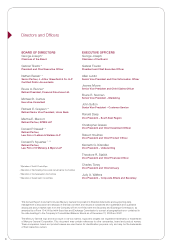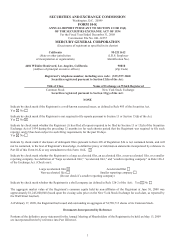Mercury Insurance 2008 Annual Report Download - page 20
Download and view the complete annual report
Please find page 20 of the 2008 Mercury Insurance annual report below. You can navigate through the pages in the report by either clicking on the pages listed below, or by using the keyword search tool below to find specific information within the annual report.
10
Reinsurance
The Company has reinsurance through the Florida Hurricane Catastrophe Trust Fund (“FHCF”) that provides coverage
equal to approximately 90 percent of $47 million in excess of $10 million per occurrence based on the latest information provided
by FHCF. The coverage is expected to change when new information is available later in 2009.
For California homeowners policies, the Company has reduced its catastrophe exposure from earthquakes by placing earthquake
risks with the California Earthquake Authority (the “CEA”). See “Regulation—Insurance Assessments.” Although the
Company’s catastrophe exposure to earthquakes has been reduced, the Company continues to have catastrophe exposure to fires
following an earthquake.
The Company carries a commercial umbrella reinsurance treaty and seeks facultative arrangements for large property
risks. In addition, the Company has other reinsurance in force that is not material to the consolidated financial statements. If any
reinsurers are unable to perform their obligations under a reinsurance treaty, the Company will be required, as primary insurer, to
discharge all obligations to its insured in their entirety.
Regulation
The Company is subject to significant regulation and supervision by the DOI of each state in which the Company
operates.
Department of Insurance Oversight
The powers of the DOI in each state primarily include the prior approval of insurance rates and rating factors, the
establishment of capital and surplus requirements and solvency standards, and restrictions on dividend payments and transactions
with affiliates. DOI regulations and supervision are designed principally to benefit policyholders rather than shareholders.
California Proposition 103 requires that property and casualty insurance rates be approved by the California DOI prior to
their use and that no rate be approved which is excessive, inadequate, unfairly discriminatory or otherwise in violation of the
provisions of the initiative. The proposition specifies four statutory factors required to be applied in “decreasing order of
importance” in determining rates for private passenger automobile insurance: (1) the insured’s driving safety record, (2) the
number of miles the insured drives annually, (3) the number of years of driving experience of the insured and (4) whatever
optional factors are determined by the California DOI to have a substantial relationship to risk of loss and are adopted by
regulation. The statute further provides that insurers are required to give at least a 20% discount to “good drivers,” as defined,
from rates that would otherwise be charged to such drivers and that no insurer may refuse to insure a “good driver.” The
Company’s rate plan was approved by the California DOI and operates under these rating factor regulations.
Insurance rates in Georgia, New York, New Jersey, Pennsylvania and Nevada require prior approval from the state DOI,
while insurance rates in Illinois, Texas, Virginia, Arizona and Michigan must only be filed with the respective DOI before they
are implemented. Oklahoma and Florida have a modified version of prior approval laws. In all states, the insurance code
provides that rates must not be excessive, inadequate or unfairly discriminatory.
The DOI in each state in which the Company operates is responsible for conducting periodic financial and market
conduct examinations of insurance companies domiciled in their states.
Market conduct examinations typically review compliance with insurance statutes and regulations with respect to rating,
underwriting, claims handling, billing and other practices.
The following table provides a summary of current financial and market conduct examinations:
State Exam Type Period Under Review Status
CA Financial 2004 to 2007 Report was issued in January 2009
CA Rating & Underwriting 2004 to 2006 Field work has been completed. Awaiting final report.
NJ Market Conduct Sept 2007 to Aug 2008 Fieldwork began in November 2008
GA Financial 2004 to 2006 Report was issued in October 2008
OK Financial 2005 to 2007 Fieldwork began in October 2008
IL Market Conduct 2007 Report was issued in August 2008
No material findings have been noted in any of these examinations.
























